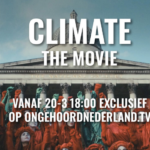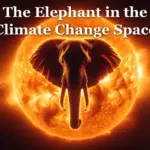Bas van Geel, een van de weinige openlijke klimaatsceptici in Nederland, spreekt aanstaande donderdagavond op een klimaatbijeenkomst in Maison Descartes in Amsterdam. De tweede spreker is de Franse arts Sandrine Segovia-Kueny, algemeen afgevaardigde van de Franse natuur en gezondheidsorganisatie (ASEF) voor de regio Ile-de-France. Ikzelf ben aanwezig als moderator van de discussie na afloop van de twee praatjes.
Bas van Geel stuurde al een synopsis van zijn praatje:
Title: Climate change: are we guilty?
I will shortly explain the various ways of climate reconstruction during the last few milion years (glacial periods – interglacials) and I will mention various causes of climate change. I will show – among others – how fast natural climate shifts can occur.
I will explain how we get information about changing solar activity in the past.
I will show evidence for solar forcing of climate change in the past.
I will pay some attention to climate alarmism (IPCC) and the temperature trends during the last few decades.
I will pay attention to the fact that climate science is not settled and that there is no consensus about anthropogenic climate change.
I will mention that – based on the behaviour of the sun during the last few years – we can probably expect climate cooling in the near future.
I will stress that energy policy is necessary, but that fear mongering (concerning anthropogenic climate change) will work contra-productive.
Klimaat en gezondheid
Het is nog niet duidelijk waar Segovia-Kueny precies over zal spreken, maar dit interview op het web geeft wel een duidelijke indicatie:
Global warming poses grave risks to human health
Climate change poses risks to human health with a rise in allergies, infectious diseases, malnourishment and other health problems, says Dr Sandrine Segovia-Kueny of the French Health And Environment Association.
By FRANCE 24 (text)Three questions to Dr Sandrine Segovia-Kueny, member of the French Health And Environment Association (ASEF), an association of French doctors.
What is the impact of climate change on people’s health?
The World Health Organisation published findings as early as 2000 showing that global warming caused 150,000 deaths each year – deaths that would not have occurred in a normal context. We expect that number to rise to 500,000 deaths per year by 2030. Yet the impact of climate change on our health is a little-known issue. People think it’s a marginal problem. We can see this even in the current summit at Copenhagen.
Which countries are most affected by climate-caused health problems?
As usual, developing countries are the most vulnerable. Climate change favours the spread of diseases transmitted by mosquito or tick bites, like dengue fever, malaria, or yellow fever, which are most rampant in sub-Saharan countries in Africa. The disease-carrying insects reproduce more and live longer in warmer temperatures. Global warming also causes natural disasters like floods, cyclones or massive draughts. There again, developing countries are the hardest hit.
Are rich countries also affected?
In developed countries, floods caused by climate change are already responsible for many human casualties. There are also heat waves: we expect there to be one major heatwave every two years in France at the end of the 21st century.
Children and people suffering from asthma are also particularly at risk, because they are particularly sensitive to air pollution. Global warming makes air pollution spikes more frequent and aggressive.
Mosquito-transmitted diseases also exist in Europe, although to a lesser degree. Lyme disease, an infection transmitted by ticks, is emerging everywhere in Europe. Certain people say that malaria could resurge in Europe – I think it’s very possible. France has a good healthcare system and is well equipped to fight the disease, but other Mediterranean countries may not be as well prepared.
Finally, climate change favours the development of all sorts of allergies: it is estimated that one out of two people will suffer from allergies by 2050. Spring pollen season, well known to all those who suffer from hay fever, lasts longer in warmer climates. And the pollen produced by plants growing in polluted atmospheres is more allergenic.
Ik heb de afgelopen jaren veel van dit soort bijeenkomsten bijgewoond en ben vooral benieuwd wat de sprekers en de aanwezigen in de zaal vinden van de recente gebeurtenissen, climategate en de kritiek op het IPCC. Is men gaan twijfelen of houdt men vast aan de bevindingen van het IPCC?
Er zijn nog kaartjes, dus hoop enkele lezers van deze blog na afloop te mogen begroeten bij de borrel.






De interviewer stelt vragen over over klimaatverandering, en Sandrine weet direct al welke kant die opgaat: opwarming! Geen woord over de tientallen of honderden Europeanen die vorige winter zijn omgekomen door de kou. Erg wetenschappelijk allemaal.
Bas van Geel heeft me ooit op het juiste spoor gezet. Je kunt én voor de bescherming van het milieu zijn en voorstander van bijvoorbeeld energiebesparing en toch grote vraagtekens zetten bij de door de mens veroorzaakte opwarming. Het is een standpunt dat ik vaak mis in klimaatdiscussies en zeker in de politiek. Het is eigenlijk schandalig dat als je kritisch bent op IPCC en het klimaatalarmisme dat je je dan zou moeten laten vertegenwoordigen door PVV en VVD.
Ik wens Bas veel succes met zijn voordracht.
Aan Gerard
Er is inderdaad weinig keus op de politieke fruitschaal. Maar om nou de VVD als optie te noemen gaat me echt te ver. Die partij wemelt van de alarmisten en verder is het afwachten om te zien uit welke hoek de wind waait. Overigens verbaas ik me telkens weer over de tegenstelling die je opwerpt. Alsof AGW-critici automatisch milieuverziekers en energieverspillers zijn. Ik kan je geruststellen; dat is niet zo.
Ook de heer Van Geel heeft eerder zijn zorg er over uitgesproken – ik meen al voor Climate Gate – dat een eventuele ontmaskering van het AGW-verhaal er wellicht toe zou kunnen leiden dat de mensen er weer oplos gaan leven. Ik deel die zorg niet. Ten eerste is het te duur, ten tweede heeft het spaarzaamheidsbewustzijn zich al aardig van de bevolking meester gemaakt, wat voor een flink deel te danken is aan de goede werken van de oude milieubeweging.
Wrang is het dan om te zien dat kopstukken en bovenlaag uit diezelfde beweging maar ook een flink deel van de doorgeleerde claque er een carbon footprint op na houden waar een bescheiden scepticus als ik u tegen zegt.
En daarmee zijn we bij het volgende probleem: Wie gaat uitmaken wie hoeveel energie mag verstoken en waaraan? Als kok weet ik aardig hoe ik een sausje uit de schift moet halen, maar een goed antwoord op deze vraag heb ik niet. Het antwoord van de groenbegaafde machthebbers met hun voornemen om ons centraal en mondiaal naar het stenen tijdperk te taxen is voor mij geen aantrekkelijk voorstel.
Je merkt overigens aan alles dat de alarmisten zich opmaken om van de “beat the heat”-expres over te stappen op de “lege olietanker”: De olie raakt op, nog 20, 30 jaar! (Samsom een weekje geleden), onze kinderen! (Samsom elke dag). En daar gaan we weer; een mooie reden om nooit meer op die gasten te stemmen lijkt me, te meer daar ze je er nooit bij vertellen hoe die heerlijke nieuwe wereld gefinancierd gaat worden.
De enige partij die zich enigzins hiertegen opzet is de PVV.
Maar of dit nu de juiste keuze is ?
In sommige dingen gaan ze wel erg veer
Om de regering eens een keer wakker te roepen zodat ze werkelijk eens naar de bevolking gaan luisten denk ik dat het een goede optie is.
Gr A
Volgens mij heeft Woedende Kok de post van Gerard niet goed gelezen.
Het urgente punt is:
Omdat CO2 niets heeft uit te staan met klimaatschommelingen, moeten we die zwendel met emissierechten liver vandaag nog afzweren.
CO2 is plantenvoedsel, laat het vrij de lucht in stromen.Het is een groene misdaad om CO2 in de grond te stoppen.
Windmolens die vanwege CO2 worden neergezet zijn ondingen: zij werken 17% van de tijd, net als bij zeilen geen wind of te veel.
In Nederland alleen al kunnen we 55 miljard Euro besparen door bovengenoemde maatregelen.
Inderdaad
Ik zeg zeker niet dat AGW critici milieuverziekers zijn. Ik ben zelf AGW kritisch en tegelijkertijd bioloog en milieukundige. Wel zeg ik dat de AGW ctitici zich op dit moment geheel ter rechterzijde van het politieke spectrum bevinden. (Ik reken Diederik Samson eerlijk gezegd nog niet mee als AGW kritisch). Erger nog, ze zijn waarschijnlijk meer tegen omdat ze ze op die manier oppositie kunnen voeren dan omdat ze nou zo goed over de opwarming hebben nagedacht.
Tegelijkertijd geloof ik niet dat de markt en de vrijheid van het individu het antwoord bieden voor de zorg voor het milieu en de planeet die wel degelijk nodig zijn. Ik ben het ook daarom met Van Geel eens, ook wat zijn zorg over het omslaan van de stemming betreft.
Het is inderdaad dodelijk vermoeiend om mensen steeds weer uit te moeten leggen dat een skeptische kijk en duurzaamheid heel goed samen gaan. En dat juist een goedgelovige houding in de AGW-theorie contra-productief kan zijn als straks blijkt dat CO2 slechts een beperkte invloed heeft op de temperatuur. Het milieubeleid in het algemeen zal dan onder druk komen te staan, maar ook de wetenschap als geheel. De positie van wetenschap wankelt al enkele decennia. De medische wetenschap strijd al lang tegen newage-achtige pseudowetenschap, met als triest hoogtepunt de discussies over vaccineren afgelopen jaar.
En de maatregelen die tot nu toe zijn genomen, maken ook niet vrolijk. Hoeveel heeft Nederland ondanks de zogenaamde zorg werkelijk genomen om die duurzame samenleving dichterbij te brengen? Er liggen plannen voor windmolenparken, maar of die er zullen komen? Alleen ondergrondse CO2-opslag, CO2-emissiehandel en voorstellen voor extra energiebelastingen in de vorm van CO2-tax.
Een op zich simpel grootschalig deltaplan om huizen in Nederland beter te isoleren – hetgeen ook een stimulans zou zijn voor de ernstig kwakkelende bouwsector – zou meer zoden aan de dijk zetten qua energiebesparing en beperking van de CO2-uitstoot.
Dus kom op Samsom en consorten: wees eens praktisch, als je op korte termijn resultaten wil halen waar je iedereen blij mee kan maken.
Fred schrijft:
"De medische wetenschap strijd al lang tegen newage-achtige pseudowetenschap, met als triest hoogtepunt de discussies over vaccineren afgelopen jaar."
Ik vind het verbazend dat zo weinig mensen zich bewust zijn van het feit dat ook de AGW-theorie grotendeels op semispirituele pseudotheorie is gebaseerd. Tot ver in de jaren '80 was het AGW-denken vrijwel onbekend. De VN adopteerde echter de "Gaia-filosofie" van James Lovelock, die claimde dat de mensheid grote rampen en catastrofes op haar hals haalde (de 'oordelen van Gaia') omdat de mens de balans tussen O2 en CO2 verstoorde. Lovelock werd niet wetenschappelijk serieus genomen, totdat de VN zijn theorie van het New-Age jasje ontdeed en het via de IPCC de wereld in bracht. De basisstelling tijdens de Conference on the Changing Atmosphere (VN, 1988) was zeer duidelijk gebaseerd op de werken van Lovelock. Twee decennia later is Lovelocks theorie opeens wereldwijd geaccepteerd, zij het onder een nieuwe naam.
Of zoals Steven Schneider, een van de AGW-grondleggers en mede-auteur van vele IPCC-klimaatrapporten zei: "the Gaia Hypothesis has now become established in mainstream science."
Gerard,
Eerst komt het vreten, dan de moraal (en nog veel meer). Hoe rijker de mens, hoe beter het hem en zijn omgeving gaat. Aan de NUL-vooruitgang die we op het gebied van b.v. ontwikkelingssamenwerking boeken kun je het effect van massieve overheidsbemoeienis zo langzamerhand wel aflezen. En ook bij al die CO2-besparende projecten en projectjes blijkt het keer op keer weer achteruitboeren.
Het verbaast mij in dit verband niets dat linkse politici nooit met een woord over Lomborg spreken, immers bij dat soort gesprekken kan men de ideologische preken gewoon in de tas houden.
Overigens komt de laatste maanden wel voldoende aan het licht dat ook de AGW-aanhangers “niet zo goed over de opwarming hebben nagedacht”. Het is triest, maar zo gaat dat blijkbaar. Ook de zogenaamde ommezwaai van Samsom bezie ik in dat licht. Het spijt me dat ik het zeggen moet, maar zijn politieke loopbaan baart hem momenteel wellicht meer zorgen dan de opwarming.
Overigens, de bekende AGW-criticus Hans Labohm heeft er verschillende malen op gewezen dat de combinatie links-AGW- kritisch in zijn kringen bepaald geen rariteit is. De soortenrijkdom is blijkbaar groter dan je denkt. Of zich hieronder ook actieve politici bevinden is mij onbekend.